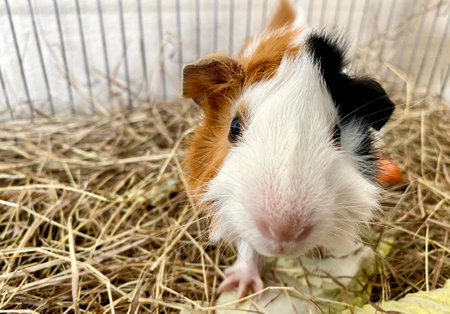Introduction to Guinea Pig Nutrition in the UK
Guinea pigs, or cavies as they are affectionately called, have become one of the most popular small pets across Britain. Their friendly temperament, gentle nature, and relatively easy care make them an ideal companion for families and individuals alike. However, when it comes to nutrition, guinea pigs have unique dietary requirements that set them apart from other small animals commonly kept as pets in the UK, such as rabbits or hamsters. Unlike many mammals, guinea pigs cannot synthesise their own vitamin C, making their diet a critical factor in maintaining their health and wellbeing. British pet owners must be particularly mindful of this nutritional need to prevent deficiencies and ensure their guinea pigs live happy, healthy lives. The table below highlights some key differences between the dietary needs of guinea pigs and other popular small pets in Britain.
| Pet Species | Vitamin C Requirement | Primary Diet Components |
|---|---|---|
| Guinea Pig | Essential – cannot produce internally | Hay, fresh vegetables, fortified pellets |
| Rabbit | Not essential – can synthesise internally | Hay, leafy greens, rabbit pellets |
| Hamster | Not essential – can synthesise internally | Seeds, grains, fresh fruit & veg |
This distinctive requirement for vitamin C makes it especially important for British guinea pig owners to understand and cater to their pets’ specific nutritional needs.
2. Why Vitamin C is Essential for Guinea Pigs
Guinea pigs, much like humans, cannot synthesise their own vitamin C due to a lack of the enzyme L-gulonolactone oxidase. This unique biological trait means they must obtain sufficient vitamin C through their diet to maintain good health. Without adequate vitamin C, guinea pigs are at risk of developing scurvy, a serious condition that can lead to joint pain, lethargy, poor coat condition, and even death if left untreated.
Vitamin C plays several vital roles in the body of a guinea pig. It supports collagen formation, which is crucial for healthy skin, gums, and joints. Additionally, it boosts the immune system and aids in the absorption of iron from plant-based foods—a particularly important factor given that guinea pigs are herbivores.
| Function | Why It Matters for Guinea Pigs |
|---|---|
| Collagen Production | Maintains strong connective tissues, skin, and joints |
| Immune Support | Helps fight off infections and keeps them healthy |
| Iron Absorption | Prevents anaemia by aiding in iron uptake from vegetables |
| Wound Healing | Promotes quicker recovery from injuries or surgery |
This biological necessity is particularly relevant in the UK, where pet owners might assume that commercially available guinea pig food provides all necessary nutrients. However, since vitamin C degrades quickly in both pelleted food and fresh produce, its important for British guinea pig owners to regularly supplement their pets’ diets with fresh sources of vitamin C and monitor their intake closely to ensure optimal health.

3. Common Signs of Vitamin C Deficiency
Vitamin C deficiency, also known as scurvy, is a serious health concern for guinea pigs, especially in the UK where dietary recommendations are strictly followed by responsible pet owners. Recognising the early signs of deficiency can make a significant difference to your guinea pigs wellbeing. British guinea pig owners should be particularly vigilant during colder months when fresh produce may be less varied or available.
Key Symptoms to Watch For
| Symptom | Description | What to Look For |
|---|---|---|
| Lethargy | Reduced energy levels and less interest in activities | Your guinea pig may appear unusually tired, spend more time hiding, or show little enthusiasm for playtime and feeding |
| Dental Issues | Problems with teeth and gums due to weakened tissues | Look out for drooling, difficulty chewing, weight loss, or visible sores around the mouth; you might notice partially chewed food left behind in their enclosure |
| Poor Coat Condition | Dull or rough fur as a result of compromised health | The coat may lose its usual shine and softness, becoming patchy or coarse to touch |
| Joint Swelling or Lameness | Inflammation and pain in the limbs | Your guinea pig may limp, have trouble moving about, or seem reluctant to stand up fully on all fours |
Spotting Deficiency Early: A British Owner’s Guide
If you notice any of these symptoms, it’s important to consult a vet experienced in small animal care—many British practices offer specialist exotic pet services. Keep an eye on your guinea pig’s daily habits and maintain a regular grooming and health check routine. In the UK, maintaining proper vitamin C intake can be challenging due to seasonal changes in available produce; supplementing with vitamin C tablets designed for guinea pigs is often recommended over adding drops to water, which may degrade quickly.
Early intervention is key. By staying informed and attentive, British guinea pig owners can help ensure their pets remain happy and healthy year-round.
4. UK-Appropriate Sources of Vitamin C
Ensuring your guinea pig receives sufficient vitamin C is essential for their wellbeing, and in the UK, there are many safe and accessible options to help meet this requirement. British supermarkets and local grocers offer a variety of fresh produce and fortified foods suitable for guinea pigs. Below is a handy guide to some of the most suitable sources:
| Food Item | Vitamin C Content | Serving Tips | Availability in the UK |
|---|---|---|---|
| Bell Peppers (especially red) | High | Serve raw, deseeded, in small chunks | Common in all major supermarkets |
| Kale | High | Offer washed leaves, avoid overfeeding due to calcium content | Widely available, especially in winter |
| Broccoli (stems and florets) | Moderate-High | Raw, chopped into bite-sized pieces | Easily found year-round |
| Parsley (flat or curly) | High | Small quantities only; high calcium levels can cause health issues if overfed | Common in supermarkets and gardens |
| Cabbage (savoy or spring greens) | Moderate | Sparingly, as too much can cause bloating or digestive upset | Readily available throughout the UK |
| Slices of orange or kiwi fruit | High (fruit) | Treat only; high sugar content means occasional small portions are best | Easily purchased nationwide |
| Fortified guinea pig pellets* | Varies (check packaging) | Mainly as a supplement to fresh veg; ensure they are specifically labelled for guinea pigs and within expiry date for maximum vitamin C potency | Sold at pet shops and online retailers across Britain |
Safety Tips for Feeding Vitamin C-Rich Foods in the UK
- Avoid iceberg lettuce: While popular, it offers little nutritional value and can upset guinea pig tummies.
- No potatoes or onions: These are toxic to guinea pigs.
- Select organic where possible: This helps minimise pesticide exposure.
- Diversify their diet: Rotate vegetables daily to provide a range of nutrients without overwhelming their system with oxalates or calcium.
- Avoid multivitamin drops in water: Vitamin C degrades quickly and may discourage drinking; direct supplementation via food is safer.
*Always check packaging for expiry dates*
This ensures your guinea pig receives active vitamin C from fortified foods. By making informed choices using widely available British produce, you can support your pet’s health all year round.
5. Supplementation: When and How
For many British guinea pig owners, ensuring a consistent intake of vitamin C can be challenging, particularly if fresh vegetables are not always available or if your guinea pig is a picky eater. In such cases, supplementation becomes an important consideration. However, it’s essential to choose safe, reliable products and administer them correctly to support your pet’s health.
How to Choose a Vitamin C Supplement in the UK
When selecting a supplement, prioritise those specifically formulated for guinea pigs, as some supplements for other animals may contain inappropriate dosages or additional ingredients. Always check for the following:
- Reputable UK Brands: Look for brands with good reviews and approval from veterinary professionals.
- No Added Sugar or Artificial Colouring: These can be harmful to guinea pigs’ digestive systems.
- Correct Dosage: Opt for products with clear dosage instructions tailored to small pets.
Popular UK Vitamin C Supplement Brands
| Brand | Form | Key Features |
|---|---|---|
| Oxbow | Tablet/Chewable | No added sugar, vet-recommended, easy to dose |
| Burgess Excel | Liquid/Tablets | Widely available, trusted by UK vets, clear labelling |
| Supreme Science Selective | Drops/Tablets | Specially formulated for guinea pigs, palatable options |
Administering Supplements Safely
- If using liquid drops, add them directly to a small piece of vegetable rather than water bottles—this ensures your guinea pig gets the right amount and avoids degradation in water.
- If using tablets or chewables, offer them as a treat or crush and sprinkle over food if necessary.
Dosage Guidelines (General Reference)
| Guinea Pig Weight (kg) | Daily Vitamin C Requirement (mg) |
|---|---|
| 1.0–1.2 kg | 20–25 mg |
If you are uncertain about the best product or correct dosage for your pet, consult a local veterinary professional experienced in small animal care. By choosing reputable brands and following proper administration techniques, British guinea pig owners can ensure their pets thrive with optimal vitamin C support.
6. Practical Tips for UK Guinea Pig Owners
Providing your guinea pig with the right amount of vitamin C is essential, but daily routines and British weather can present unique challenges. Here are some practical tips tailored specifically for pet owners in the UK to help you plan a nutritious diet and monitor your guinea pig’s health.
Diet Planning: Choosing the Right Foods
In Britain, fresh produce is widely available, but seasonal changes may affect what you can buy. Focus on locally sourced fruits and vegetables rich in vitamin C. Below is a handy table of vitamin C-rich foods that are commonly found in UK supermarkets:
| Food Item | Vitamin C Content (mg/100g) | Availability in the UK |
|---|---|---|
| Bell Peppers (Red/Yellow) | 120-140 | Year-round |
| Kale | 120 | Autumn-Winter |
| Broccoli | 90 | Year-round |
| Parsley | 130 | Year-round (indoor herb pots) |
| Cabbage (Savoy/Spring Greens) | 30-60 | Spring-Autumn |
Avoid feeding iceberg lettuce or potatoes, as they offer little nutritional value and could upset your guinea pig’s stomach.
Supplementation: Ensuring Adequate Intake
The unpredictable British climate means outdoor grazing isn’t always possible. Consider using vitamin C supplements formulated for guinea pigs, especially during winter months when fresh produce variety may be limited. Avoid adding vitamin C drops to water bottles, as it degrades quickly and may put off your pet from drinking.
Recommended Daily Vitamin C Dose
- Piglets & Pregnant/Lactating Sows: 20-30 mg per day
- Adult Guinea Pigs: 10-20 mg per day
Regular Health Monitoring: What to Watch For
Perform weekly health checks at home and keep an eye out for early signs of vitamin C deficiency, such as lethargy, swollen joints, or rough coat. If you notice any changes, consult your local vet promptly. Registering with a small animal specialist familiar with guinea pigs is highly recommended in the UK.
Quick Checklist for British Owners:
- Source fresh greens from local markets or grow indoors during colder months.
- Store vegetables properly to retain vitamin content (refrigerate and use within 48 hours).
- Avoid sudden dietary changes—introduce new foods gradually.
- Mimic natural grazing by providing forage hay and occasional safe garden herbs.
- Keep up-to-date with routine vet checks, especially after seasonal dietary shifts.
Caring for guinea pigs in Britain requires thoughtful planning around diet and regular monitoring. By following these tailored tips, you can ensure your furry companions remain healthy and happy all year round.


